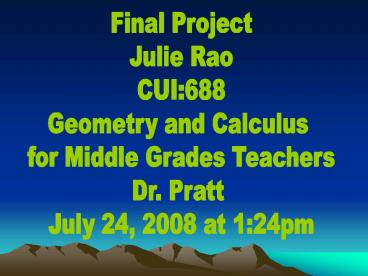Final Project PowerPoint PPT Presentation
1 / 15
Title: Final Project
1
Final Project Julie Rao CUI688 Geometry and
Calculus for Middle Grades Teachers Dr. Pratt
July 24, 2008 at 124pm
2
Final Project Question
"Why do I, as a middle grades mathematics
teacher, need to know about calculus and
analytic geometry?"
3
1. To realize that Mathematics, Algebra,
Geometry and Calculus are all one cohesive unit
that build off of and fold back onto each other.
I can show this to my students in the way I
teach.
What is calculus?Calculus takes the ordinary
rules of algebra and geometry and tweaks them so
they can be used on more complicated
problems.Calculus Wiki Growth is a non-linear
phenomenon which involves folding back to
re-member and re-construct new understanding. Pir
ie Kieran (1994)
4
I really agree with you on " helping their math
process so I do not lead them down the wrong path
just to get them through middle school and pass
their EOG and EOC". I have felt that way. I
don't want to teach as if this topic is covered
and it's over. I want students to see the
connections to all the different math topics like
we looked at with the shell fractal image.
Hopefully by learning where the students are
headed we can show them what's to come or at
least mention how it will relate to future
topics. Sunday, 07/13/2008 329 PM by Kara
Fisher
5
2. To know where the students are headed in
regards to mathematics and prepare meaningful
lessons to foster conceptual understandings and
promote problem solving skills.
Conceptual understanding is critical to learning
mathematics, including the ability to tackle
unfamiliar problems. Perrin Quinn (2007)
6
I was asked to respond to a question this week
during my workshop "How do you know when you are
good at math?" My answer was similar to what you
said about plugging in numbers and getting
answers during your calc I and calc II course. I
remember doing that same thing, making A's, and
thinking "hey I'm pretty good at math." But as a
teacher I am realizing that being good at math is
so much more than getting the right answer. It
is connecting concepts, making conjectures,
building on prior knowledge, and understanding
the "why." It seems like you have made several
of these connections and I think this will help
you with your project. Sunday, 07/20/2008 222
PM by Amanda Williams
7
3. To expose students to "Calculus" so that they
will begin to understand what it is, how it is
used, why it is relevant and will not fear it.
I agree with you, I took college calculus I and
II and I never really understood what I was
doing. I think that the hands-on activities that
you spoke of gave me a better understanding as
well. If only our teachers had thought to use
these activities, maybe we would have a better
understanding of Calculus. Monday, 07/21/2008
1108 AM by Katherine Eccard
8
4. To be a more confident teacher
Knowing where the students will be going in
terms of higher level mathematicsHaving a
bigger and better tool boxAsking higher level
thought provoking questionsBeing able to share
higher level knowledge with students (and know
what you are talking about)Preparing students
for the future (relating to calculus)To help
other teachers realize why you are teaching a
concept the way you are
9
5. To have students that are more confident in
mathematics
Relating middle school math to calculus will
make the students feel more advanced and
smartTelling the students that the problem of
the day came from our summer calculus class If
they know (in general) what Calculus is, they
might not fear it as much when they have to take
it
10
6. Reduce Misconceptions
I think you are on to something when you stated
If we teach without knowing what is to come in
the future in regards to their future math
courses, there are many misconceptions they might
have, by knowing about calculus, we can work to
lessen their misconceptions. (Just as elementary
school teachers need to know what students will
be learning in middle school)" One example of
this is the misconception that you can not
subtract a bigger number from a smaller number.
Students hang on to these misconceptions and it
becomes a stumbling block in their math
path. Monday, 07/07/2008 1111 AM by Stella
Foster
11
(No Transcript)
12
Picture from Wikipedia
Pictures from Calculus Wiki
13
Picture from Wikipedia
Picture from Calculus Wiki
14
Picture from Wikipedia
Picture from Calculus Wiki
15
THIS MATH
COHORT ROCKS!
THANK YOU!

